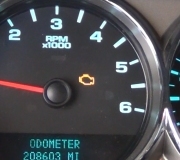Thursday, January 12th, 2017 AT 12:18 PM
So I bought my car in May it had eighty seven miles on it. Anyway, I got the first oil change back in October ever since then my car acts funny once in a while. The day of the oil change after I got the car back it was fine, until later that afternoon I went to my moms after and the car sat for like eleven and half or so. I went to leave and as soon as I started my car it was shaking and the service engine soon light flashes on/off for like five to ten seconds then phased out and car was normal again (no shaking/light off) got to my destination no other problems left my appointment no other problems. Next day after oil change the car was fine to my first errand, went to start it and it started shaking and service light flashes on/off, so I took it right to the mechanic which happened to be right on the same road and as soon as I pulled in the lot car was fine again. So I shut it off to talk to the mechanic he comes out to my car starts it nothing wrong he hooks it up to the computer he had and nothing comes up on it (no codes). I leave go run the rest of my errands car is perfectly fine for the rest of the month/and November. Then I was driving home from somewhere December third and the car starts shaking again and the same light flashes on/off I made a u-turn to bring it to mechanic and as soon as I turned around it stopped so I drove it home. No other problems for the rest of the day/month! Then January second I am on my way to work car runs fine until I hit the second to last exit where I have to get off and car starts shaking light does the thing again. No other problems for the rest of the night/week. Until yesterday January eleven, the car was fine when driving to meet someone, went to start it and the car starts shaking and light goes on/off again but for a little longer and so I make it to my destination turn car off. Leave last night and no other problems for the rest of the night. When the car shakes it feels like it wants to stall, but does not and it does not matter if I have a full tank of gas or not or half. There are no other lights going on, no smells or leaks and nothing like this has ever happened in the four months that I have had the car until I got the oil changed in October. The car never loses any power just shakes and light flashes on/off. So someone please help it is not an everyday thing and it is freaking me out because nobody else has driven it or is in the car when it happens. The light was not on when the mechanic hooked it up so I do not know if that is it. It never registered any codes? Everyone keeps telling me it is fine because I have AAA and whatever. I am freaking because I love this car. So if someone could tell me what I should do I would appreciate it.


